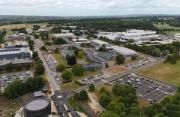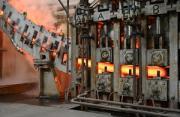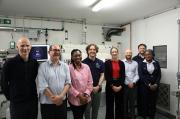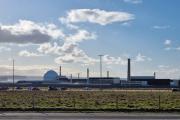Warning Signs Removed From Sandside Beach As Perceived Particles Threat Lessened
7th December 2006
The third report of the Dounreay Particles Advisory Group states that the possibility of coming into direct contact with a particle at Sandside is extremely small and would not cause any discernable health effect.
As a result existing signs, which were erected by the estate, were removed at the weekend by the estate of its own choice. Following this Sandside Estate invited UKAEA to enter preliminary discussions about new signs to provide current information to the public. These initial discussions have now taken place.
Sandside Estate offered to discuss in conjunction with UKAEA the need, wording and positioning of future signage at Sandside with the Highland Council, SEPA and Highland Health Board subject to a speedy decision.
Phil Cartwright, Land Remediation and Particles Project Manager said "We are pleased to work with the owners of Sandside Estate and will also involve the key agencies to arrive at suitable wording for new signage which provides current information on this issue to the public"
Mr Minter owner of Sandside Estate said today "We do still have damage occurring to our land but that is not part of the public health issue which is what our old signs were to protect. I believe we have handled the signage responsibly especially given our duty of care. Our signs were erected on legal advice and worded on expert advice - they were temporary and precautionary until an official opinion was (belatedly) declared. When
at last the risk of harm from the particles of the radioactivity detected at Sandside so far, was officially declared minimal by DPAG, the placement of our signs became unnecessary so I ordered them to be removed straightaway. Regard must be had for the wording used by the key agencies at Dunnet Bay where only one very minor particle has been found".
Particles were generated during the dismantling and preparation for reprocessing at Dounreay of spent nuclear fuel. There is evidence of some of these particles entering the drainage systems at Dounreay and being discharged to sea.
A report was released by DPAG in November 2006 which provides their latest thinking on this issue. See Here
Restrictions on fishing are in place in this area.
UKAEA is carrying out a study to determine if there is a better option to reduce the risk from particles than just the current strategy of monitoring beaches. As part of this, full public consultation on the options is scheduled for early 2007.
See Here
Related Businesses
Related Articles
UKAEA develops 3D printing for fusion components
At its recently opened Central Support Facility (CSF), UKAEA has commissioned an electron beam additive manufacturing machine that can be used to incorporate tungsten into components, alongside a selective laser manufacturing machine. Fusion can play a key role in a global low carbon energy future.Advancing Fusion Remote Maintenance: Industry Collaboration Driving Innovation
As part of the Fusion Futures (FF) programme, UKAEA's Remote Applications in Challenging Environments (RACE) has partnered with industry leaders to develop two groundbreaking technologies for remote maintenance in fusion energy engineering. Thanks to FF funding, industry has taken the lead in maturing UKAEA technology concepts—delivering real-world solutions that enhance operational autonomy and reduce maintenance burdens in extreme environments.UKAEA launches International Fellowships Scheme for fusion
UKAEA has launched the International Fellowships Scheme, an initiative to help expand the global talent pool supporting the fusion industry. The scheme is part of the UKAEA's Fusion Opportunities in Skills, Training, Education and Research (FOSTER) Programme, which aims to train, support, and empower the next generation of professionals, who will help deliver fusion power to the grid.Kyoto Fusioneering and Astral Systems join Culham fusion hub
UKAEA's Culham Campus welcomes Kyoto Fusioneering and Astral Systems as its latest tenants. Two pioneering companies, Kyoto Fusioneering and Astral Systems, have joined the growing cluster of fusion technology and AI organisations at United Kingdom Atomic Energy Authority's (UKAEA) Culham Campus.
Fusion-grade Steel Produced At Scale In UK-first
Researchers achieve 10x production cost savings for reduced activation steel. A United Kingdom Atomic Energy Authority (UKAEA) working group has successfully demonstrated the industrial scale production of fusion-grade steel.
UKAEA To Lead The Creation Of A Robotics And AI Cluster
UKAEA will lead the creation of a new £4.9m nuclear robotics and artificial intelligence cluster across Cumbria and Oxfordshire. The robotics and AI cluster was announced by UK Research and Innovation (UKRI) as one of seven new projects to kickstart economic growth and address regional needs: www.ukri.org The robotics and AI cluster will link Cumbria and Oxfordshire to accelerate the decommissioning of the UK's legacy nuclear fission facilities and keep people out of hazardous environments.
Diamonds Are Forever? World-first Carbon-14 Diamond Battery Made In Uk
The world's first carbon-14 diamond has been produced with the potential to provide power for thousands of years. Scientists and engineers from the UK Atomic Energy Authority (UKAEA) and the University of Bristol have successfully created the world's first carbon-14 diamond battery.
UKAEA Monthly Newsletter Latest Edition
Find out what has been happening at UKAEA in our monthly newsletter. Read about our recent activities and upcoming events.
UKAEA Newsletter - Edition 11 Published Today
Find out what has been happening at UKAEA in our monthly newsletter. Read about our recent activities and upcoming events.
Corwm Visits Dounreay Nuclear Site
Members were given an overview of the scale of the problem and challenges faced in the decommissioning of the site. In the last week of March 2024, several members of CoRWM led by the Chair, Sir Nigel Thrift, made the long journey up to the North of Scotland to visit the Dounreay nuclear site, now managed by Nuclear Restoration Services.
